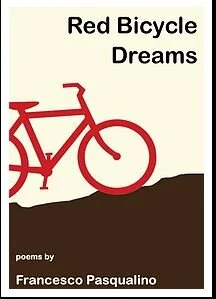Red Bicycle Dreams by Francesco Pasqualino
Main Street Rag
$13.00
Click Here to buy!
Reviewed by Brooke Palma
Francesco Pasqualino’s Red Bicycle Dreams takes its reader on a journey of the poet’s thoughts as he travels the roads of his native Pittsburgh and beyond. Many reviews of this enjoyable book focus on the trip the book takes us on and its ruminations on growing older and the conclusions one arrives at along the way. While Pasqualino writes masterfully about these subjects, what impressed me more were the explorations about the creative process itself that Pasqualino invites the reader to join him in.
What I found most compelling about the collection of poems is Pasqualino’s conversational style and lyrical images. The opening poem, “I’m Getting Old,” is a powerful ars poetica that finds the poet coming to terms with “hard varicose branches so still, against winter’s soft, silver skies.” He views the scene before him and sees “river banks remembered, as not quite so tall.” In pondering the landscape before him, he harkens back to William Carlos Williams’ “The Red Wheelbarrow” and reminds us how much power inanimate objects hold when viewed through the lens of poetic imagery. He writes,
From a window upstairs,
I see my father’s old, rusted wheelbarrow
leaning
against a tired, gray shed.
The poem ends here, leaving us with this view that encapsulates the emotion conjured up by a tired shed and the rust on an old wheelbarrow. By using simple language and an everyday landscape, Pasqualino gives emotion to these tired and quotidian objects.
Throughout Red Bicycle Dreams, Pasqualino’s lyrical poems show us a poet in his prime reflecting on the art of creating poems. In “Best Seller,” he is at his best, as he describes the “pouting, angry look” of a female writer pictured on the cover of Poets and Writers the reader finds him perusing. Using a conversational tone (as if this is an intimate conversation just between himself and the reader over the pages of the open magazine), he explains that if he were to be found on the cover of such a magazine, he’d “smile like a roadside stand of flowers on an Easter Sunday.” He goes on to explain that he would
Not waste the photographer’s time
trying to find in methat just right sulking look of an author,
the “Here I am, and I know your pain” look.
Because who would want to read a poet?
whose brooding eyes were not willing to pull a trigger
for their creative blood to stain the pages red.
“Best Seller” continues the conversation we’ve been engaging in with Pasqualino throughout the pages of Red Bicycle Dreams that focuses on the bond between writer and reader. In this poem, he asks who would read a writer “who did not seem so anguished as to climb a bridge, and threaten to jump before losing you as a reader.” These final lines give us the crux of the poem’s meaning. In violent language, Pasqualino refutes the idea of a writer’s fame or self-importance and reminds us once again of the vital relationship between writer and eventual reader. In contrast to the simple, everyday language of “I’m Getting Old,” in this poem, Pasqualino engages in creative hyperbole to drive home the importance of the relationship between writer and reader.
One of my favorite poems in this collection is “Poetry Workshop with Ted Kooser,” where Pasqualino shares the writing lessons he learned from Kooser, who sat in a chair, “made in a much simpler era…of a well-lived life, worn, comfortable cushions, with an inviting read.” He shares with the reader the skills he learned from Kooser, who
…taught us to look for life
in the tiniest cracks of the earth.
And tell of it in soft, unassuming tones,
spiked with brightly chosen words.
I’m sure that Kooser would approve of Pasqualino’s use of the unassuming tones and well-chosen words that make up this collection. Kooser’s advice encapsulates Pasqualino’s style throughout this book, where the poems hold the reader’s attention, “like the posts of an old fence, peeking out, of a snow-covered Nebraska field.” In describing Kooser’s lyrical advice, Pasqualino is most himself in using simple language to great effect to draw the reader into an ongoing conversation. What strikes me most about this poem is Pasqualino’s ability to use such precise and specific language to describe abstract concepts. Writing about writing is not easy work, but Pasqualino makes his points succinctly while still drawing the reader into yet another inviting conversation about poetry.
Reading Red Bicycle Dreams felt like having a great conversation with a friend about art over a perfect cup of espresso. Francesco Pasqualino left me with a wonderful experience of thinking about the writing process and the eventual product of that process as a reader. Using his conversational style, he invites us into his exploration of poetry and the writing process. This conversational style reminds me of the conclusion of Rainer Maria Rilke’s poem, “Pathways, where a writer pursues their solitary craft with one dream: “You come too.” Pasqualino asks us to come, too and we are lucky to be invited along for the ride.
Brooke Palma grew up in Philadelphia and currently lives in West Chester, Pennsylvania. Many of her poems focus on the connections between culture and identity and finding beauty in the everyday. Her work has been published in The Mad Poets’ Review, Moonstone Arts, Toho Journal, and online at E-Verse Radio. Her chapbook, Conversations Unfinished, was published by Moonstone Press in August 2019. She hosts the Livin’ on Luck Poetry Series at Barnaby’s West Chester.


